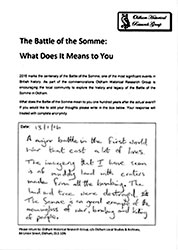|
23rd January 2016
"What is clear to me is that the Battle of the
Somme took the settling of conflicts to a new place in
terms of timescale and horror. It is very difficult for
us, a hundred years on, to view this history as a foolish
mistake to be blamed on old generals finding it difficult
to get to grips with with the type of warfare they now
found themselves in with the result of mass slaughter
of the youth of the time, giving the old saying 'Lions
led by Donkeys' bantered around years later.
If we could replay history we would have certainly configured
events differently, but alas this is not within our scope
of possibility, so now we try to make sense of it as best
we can, recognising that judgements and understanding
will always be partial and confused.
Most of us struggle with the implications of war be it
the Somme or elsewhere and we are happy to devolve much
of the responsibility to others, both for decisions and
conduct. This is as true today as it was 100 years ago.
My grandfather, in the K.O.S.B. was wounded a couple of
weeks before the Somme offensive and taken prisoner. I
doubt I would be here now, looking at the odds, as the
K.O.S.B. was in the thick of it two weeks later in July."
|
20th April 2016
"
My grandfather fought on the Somme but thankfully he returned. Unfortunately he was gassed resulting in damaged lungs.
I am visiting the Somme this year as it is the centenary of the battles. I just feel I would like to learn more about what he went through and to see the graves of all those men who gave their lives so we could be free.
Thank you."
|
|
13th January 2016
"A major battle in the First World War that cost
a lot of lives. The imagery that I have seen is of muddy
land with craters made from all the bombing. The land
and trees were destroyed. The Somme is an example of the
meaningless of war, bombing and killing of people."
|
20th January 2016
"If we know anything at all about WW1 it is that
the Battle of the Somme has gone down in history as having
taken so many hundreds of thousands of lives needlessly;
that our perception of the generals, and in particular
Haig, is that they were without compassion for the dead,
the wounded and the widows with children left at home;
that they considered the troops expendable.
There have been many attempts to justify the slaughter
and deny the callous indifference to suffering ... but
can the end ever justify the means?"
|



